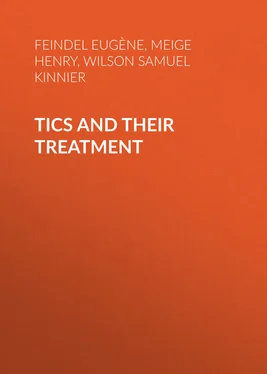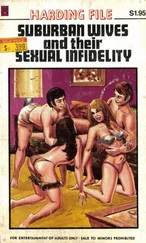Henry Meige - Tics and Their Treatment
Здесь есть возможность читать онлайн «Henry Meige - Tics and Their Treatment» — ознакомительный отрывок электронной книги совершенно бесплатно, а после прочтения отрывка купить полную версию. В некоторых случаях можно слушать аудио, скачать через торрент в формате fb2 и присутствует краткое содержание. Жанр: Здоровье, Медицина, foreign_antique, foreign_language, на английском языке. Описание произведения, (предисловие) а так же отзывы посетителей доступны на портале библиотеки ЛибКат.
- Название:Tics and Their Treatment
- Автор:
- Жанр:
- Год:неизвестен
- ISBN:нет данных
- Рейтинг книги:4 / 5. Голосов: 1
-
Избранное:Добавить в избранное
- Отзывы:
-
Ваша оценка:
- 80
- 1
- 2
- 3
- 4
- 5
Tics and Their Treatment: краткое содержание, описание и аннотация
Предлагаем к чтению аннотацию, описание, краткое содержание или предисловие (зависит от того, что написал сам автор книги «Tics and Their Treatment»). Если вы не нашли необходимую информацию о книге — напишите в комментариях, мы постараемся отыскать её.
Tics and Their Treatment — читать онлайн ознакомительный отрывок
Ниже представлен текст книги, разбитый по страницам. Система сохранения места последней прочитанной страницы, позволяет с удобством читать онлайн бесплатно книгу «Tics and Their Treatment», без необходимости каждый раз заново искать на чём Вы остановились. Поставьте закладку, и сможете в любой момент перейти на страницу, на которой закончили чтение.
Интервал:
Закладка:
In O.'s case the inhibitory influence of the will on his tics is abundantly manifest. Should he find himself in the company of one from whom he would fain conceal his tics, he is able to repress them completely for an hour or two, and similarly if he is deep in an interesting or serious conversation. Nevertheless, the desire to let himself go obtrudes itself again, and if he can refrain no longer he will invent any pretext for leaving the room, abandoning himself in his moment of solitude to a veritable debauch of absurd gesticulations, a wild muscular carnival, from which he returns comforted, to resume sedately the thread of the interrupted dialogue.
O. is fond of cycling, and while at first the attention that the necessary co-ordination of hands and feet demanded proved an effective barrier in the way of his tics, now that he can maintain his equilibrium automatically his head assumes its favourite attitude of posterior displacement. His devotion to a game of billiards, or to such exercises as fencing or rowing, is never interfered with by an unruly tic. He is a great fisher, and when he "has a bite," or is expecting one, he will remain motionless indefinitely; his tics do not hinder him from preparing his bait with the minutest care. But let his interest in his prospective catch fade, let the fish be disinclined to "take," and there will be a renewal of the movements.
In his sleep they one and all disappear. The mere assumption of a horizontal position, however, no longer suffices to bridle them, and before dropping off to sleep he passes many a minute in seeking comfort. The rubbing of his head on the pillow, the rustling of the clothes, disturb and exasperate him, and he turns in this direction and that for relief; yet should he hear or feel nothing, he will change about once more in the search for a sensation or a sound. Thus has it come about that to procure slumber he has adopted the extraordinary plan of lying at the very edge of the bed and letting his head hang over.
The series is not yet at an end.
O. exhibits a tic of the inferior maxilla. He protrudes and retracts his jaw alternately in his endeavour to elicit cracking noises from his temporo-maxillary articulations. At one time his hands used to join in the fray, the goal being to overcome the masseters and effect a sort of dislocation. A biting tic ensued. One day O. was alarmed to discover two dark patches on the internal aspect of the cheeks, but was reassured on learning from his sister – whose proclivities lay in a similar direction – that she had noticed the same in her own case, and that it was the result of constant nibbling at the buccal mucous membrane.
Nor was this the solitary biting tic. Formerly a pencil or a pen-holder used to be unrecognisable at the end of twenty-four hours, and the handles of canes and umbrellas suffered as well. To obviate the nuisance he entertained the unfortunate idea of using metal pen-holders and carrying silver-mounted walking-sticks; but his teeth failed to make any impression on the objects, and began to break in consequence. The irritation produced by a small dental abscess proved an additional source of mischief, for he developed the habit of trying, with finger, cane, or pen-holder, to shake the teeth in their sockets, and was finally compelled to have the incisors, canines, and first molars drawn. Then he ordered a set of false teeth – a move that afforded a new excuse for a tic. Every moment the set was in imminent risk of being swallowed, so vigorously did his tongue and lips assail it. Fortunately such an accident has never occurred, although he has already broken several sets. Sometimes he would be seized with an insane impulse to take his teeth out, and would invent the flimsiest pretext for retiring; the set would then be extracted and immediately reinserted, to his complete satisfaction and peace of mind.
An infinite variety of scratching tics must be added to the number. He has also a tic of phonation dating back to his fifteenth year. His custom was, when learning his lessons at school, to punctuate his recital of them with little soft expiratory noises that may still be distinguished to-day among a host of other tics. The following is his proffered explanation of the pathogeny of this "clucking" tic:
We who tic are consumed with a desire for the forbidden fruit. It is when we are required to keep quiet that we are tempted to restlessness; it is when silence is compulsory that we feel we must talk. Now, when one is learning his lessons, conversation is prohibited, the natural consequence being that he seeks to evade the galling interdict by giving vent to some inarticulate sound. In this fashion did my "cluck" come into being. Moreover, we abhor a vacuum, and fill it as we may. Various are the artifices we might employ – such, for instance, as speaking aloud; but that is much too obvious, and does not satisfy: to make a little grunt or cluck, on the other hand – what a comfort in a tic like that!
We need not smile at these explanations, for they are corroborated by the facts of clinical observation. Fear of silence is nothing else than a form of phobia, comparable to the fear of open spaces.
O.'s account of the origin of his tics supplies further evidence of the mental infantilism of those with whom we are at present concerned. It is the prerogative of "spoilt children" to wish to do exactly what they are forbidden to do. They seem to be animated by a spirit of contrariness and of resistance; and if in normal individuals reason and reflection prevail with the approach of maturity, in these "big babies" many traces of childhood persist, in spite of the march of years.
In the strict sense of the words there never has been any echolalia or coprolalia in O.'s case, though it has happened that expressions lacking in refinement have escaped him; but he never has been consciously yet irresistibly urged to utter a gross word. The sole vestige of anything of the kind is a sort of fruste coprolalia that consists in an impulse to use slang – an impulse which he cannot withstand and which he finds consolation in obeying.
Some additional details may be submitted to illustrate the intimate analogies between tics and obsessions.
O. is a great cigarette smoker, and with him the call to smoke is inexorable. It is not so much, however, the effects of the narcotic for which he seeks as the sum of the sensations derived from the act – the rustling of the tobacco in the paper, the crackle of the match, the sight of the cloud of smoke, the fragrance of it, the tickling of nose and throat, the touch of the cigarette in the fingers, or between the lips – in a word, a whole series of stimuli, visual, auditory, olfactory, and tactile, whose habitual repetition gradually introduces into the act of smoking an automatic element that brings it into line with the tics. The suppression of this parasitic function commonly produces a feeling of the utmost discomfort; inability to indulge in it causes the keenest anguish. More agonising than the actual impossibility of smoking is the idea of its being impossible. Hence it is that O. lights cigarette after cigarette, taking a few whiffs at each and throwing them aside scarce touched, or leaving them here, there, and everywhere. The dose is immaterial; it is the rehearsal of the act he finds so soothing.
In regard to his taste for liquor a similar description might be given. The intoxicating effect of any beverage had little attraction for him; it was the drinker's gesture and the numerous accompanying sensations that he sought to renew. Any form of drink, therefore, served to gratify his desire; in other words, his behaviour revealed a phase of dipsomania rather than a stage of alcoholism. For that matter, the development of symptoms of alcoholic poisoning proved a blessing in disguise, since they reinforced the inhibitory power of the will, and enabled it to abort a sensori-motor habit that had wellnigh become established.
Читать дальшеИнтервал:
Закладка:
Похожие книги на «Tics and Their Treatment»
Представляем Вашему вниманию похожие книги на «Tics and Their Treatment» списком для выбора. Мы отобрали схожую по названию и смыслу литературу в надежде предоставить читателям больше вариантов отыскать новые, интересные, ещё непрочитанные произведения.
Обсуждение, отзывы о книге «Tics and Their Treatment» и просто собственные мнения читателей. Оставьте ваши комментарии, напишите, что Вы думаете о произведении, его смысле или главных героях. Укажите что конкретно понравилось, а что нет, и почему Вы так считаете.












